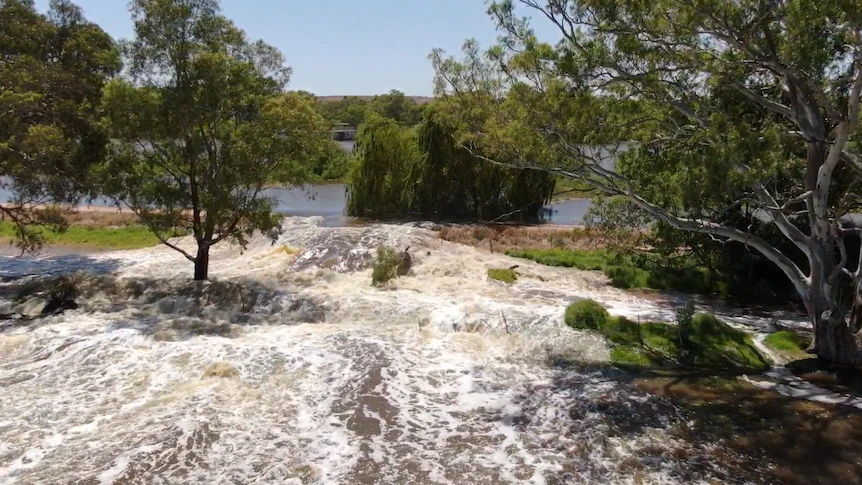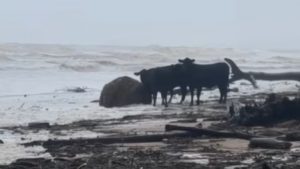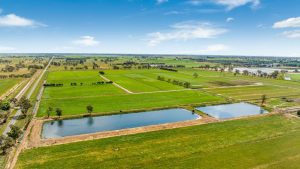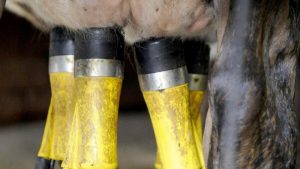
Key points:
A flood assistance package worth $126 million has been announced
Several agricultural levees have been breached or overtopped along the lower Murray River
The SES says people should not walk on levees
Premier Peter Malinauskas and federal Emergency Management Minister Murray Watt this morning announced $126 million in funding to support residents and businesses affected by flooding along the river.
“This is the biggest funding package for any disaster to our understanding in the state’s history,” Mr Malinauskas said.
“It demonstrates just how serious we are to do the preparatory work but to do the recovery as well, because the clean-up effort is going to be big.”
The package, jointly funded by the federal and state governments, includes $60 million to clean up hazardous waste, $10 million to assess properties and reconnect their services, and grants of $50,000 for flood-affected businesses and $75,000 for flood-affected primary producers.
“This package involves significant support for South Australian households, primary producers, councils and many other groups who are going to be impacted by the floods,” Mr Watt said.
Opposition spokeswoman for the River Murray Nicola Centofanti welcomed the funding, saying it needed to be delivered swiftly and effectively.
“Recovery and clean-up will take time and it’s critical those affected get the support they need to bounce back as quickly as possible,” she said.
“Funding is a good start, but it’s the on-the-ground delivery of the assistance package which will be the most important thing.”
Flooding expected in Lower Lakes
The State Emergency Service (SES) said the Murray was higher than expected at Blanchetown and there were now concerns around potential flooding in Lake Alexandrina, coinciding with high tides.
Flows have been dropping at the border and the peak is expected to reach Cobdogla later today, and Waikerie in the next four days.
Flooding peaked in Loxton yesterday and is expected to peak at Blanchetown, Swan Reach and Mannum between January 4 and 13.
About 3,400 houses have been impacted by flooding, including 393 primary residences, although not all of these properties have water over the floorboards.
Power has been disconnected to 3,190 properties.
Levee breaches along lower Murray
Agricultural levees along the lower River Murray at Mypolonga, Toora, Mobilong, Cowirra, Wall Flat, Long Island, Long Flat, Pompoota and Swanport have been breached or overtopped.
The SES is also working to build another levee around the Mannum Rowing Club to deal with a failing stormwater drain.
The levee breach at Wall Flat, north of Murray Bridge, sent buffalo farmer Corey Jones rushing to move his stock to higher ground yesterday, the second time he has had to enact an evacuation plan in a week.
The water inundated the prime pastures within half an hour.
“[I] could see a bit of a glare of water coming over the bank and, before you know it, it started going a bit faster and, yeah, it was just a matter of getting the girls back up to high land,” he said.
Mr Jones had to move his buffalo from their previous location at Mypolonga on Boxing Day, after a levee breach there.
It cost him about $15,000 to relocate his business to Wall Flat, but he said despite applying for a state government grant for a generator, he has yet to hear back.
He is faced with the cost of feeding his cattle hay for months until he can get back onto the plains.
“I feel like there could be a bit more to help for the actual farmers on the flood plains, especially with me having to relocate,” he said.
The state government said impacted businesses should contact relief centres for case-by-case assessments.
SES warns about levee safety
The SES says more levee breaches are expected as the flood peak moves downstream.
It has warned property owners to regularly inspect their levees, enact their flood plan and move stock to higher ground.
SES chief of staff Robert Charlton warned people not to walk on levees because there was not always a warning before one started to crumble.
He said the SES would do its best to rescue people if such a thing should happen, but crews fear they may not be able to get there quick enough.
“We do not want to see what we would call a catastrophic failure where there’s a significant breach … and water comes through,” he said.
“We’ve all seen those images on the TV, both here and interstate, and the last thing we want is for somebody to be on a levee when that occurs.”
The ferry at Tailem Bend is expected to close in the coming days because of water over nearby roads.
























